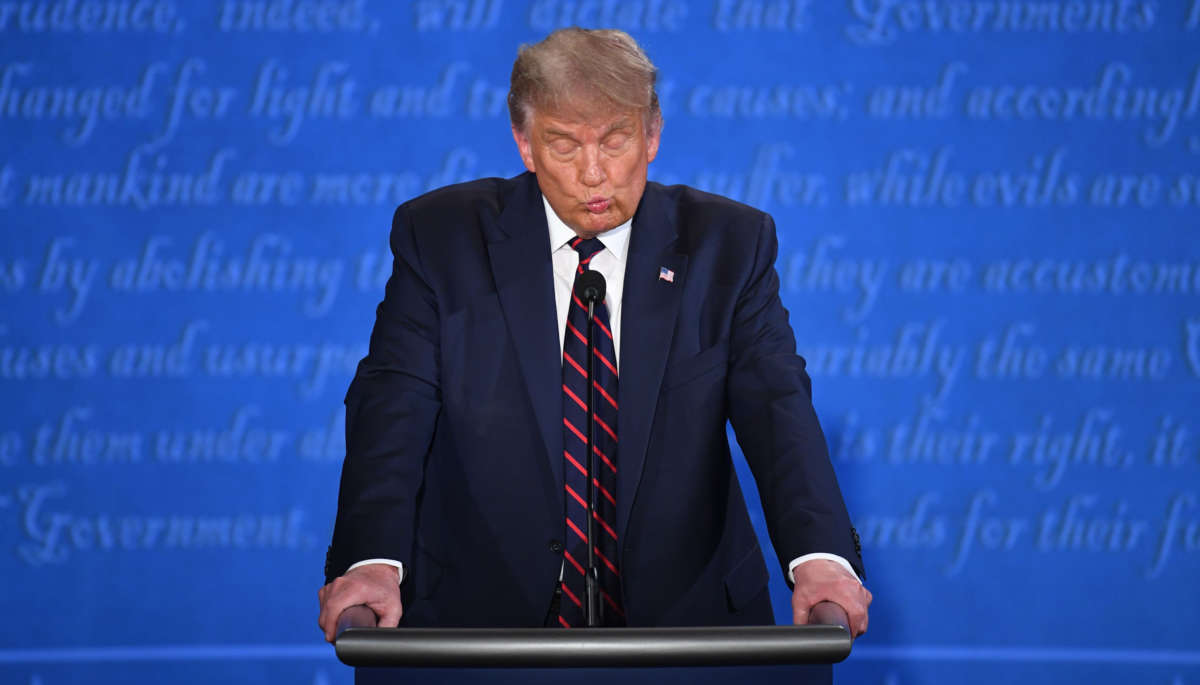President Donald Trump’s campaign advisers are reportedly urging him to approach the final debate of the 2020 presidential election season with a calmer demeanor, but he appears already to be dismissing the strategy by attacking the character of the moderator just days before the debate is set to take place.
Those coaching Trump on how to improve upon his dismal showing at the first debate tell Axios they are advising him to appear more likable this time around. Trump is being advised not to interrupt his opponent, Democratic presidential nominee Joe Biden, which he did 71 times during the first debate. (Biden interrupted Trump 22 times.)
The Trump campaign hopes that the president can turn his prospects around in the final weeks of the election by coming off as more genial.
“All Trump has to do is give people permission to vote for him.… He did exactly the opposite of that in the first debate,” one adviser explained to Axios. “So hopefully he can right the ship in this one, because his re-election may depend on it.”
Trump is already deviating from the plan, however, by tweeting disparaging comments about the debate’s moderator, NBC News’s White House correspondent Kristen Welker.
“She’s always been terrible & unfair, just like most of the Fake News reporters,” Trump said in his social media post over the weekend, “but I’ll still play the game.”
Trump’s tweet quoted a tweet from his son, Don Jr., which cited an article from the New York Post tabloid website that claimed Welker has “deep Democrat [sic] ties.”
Several media pundits and political operatives came to Welker’s defense.
“Ask anyone in politics in D.C., D[emocrat] or R[epublican] and they’ll tell you what a real pro she is,” wrote Joe Lockhart, who served as press secretary for former President Bill Clinton.
Even individuals within Trump’s orbit have made glowing remarks on Welker in the past.
“I have a very high opinion of Kristen Welker,” Trump campaign adviser Jason Miller recently said. “I think she’s going to do an excellent job as the moderator…. I think she’s a journalist who is very fair in her approach. And I think she’ll be a very good choice for this third debate.”
Topics for the third debate announced by Welker late last week include COVID-19, American families, race in the U.S., climate change, national security and leadership.
Trump’s criticisms of Welker come as the Commission on Presidential Debates (CPD) announced it will meet on Monday afternoon to discuss potentially changing aspects of the final debate. (The second debate was cancelled.) What they might alter, however, is unknown, and the CPD may choose to leave the format unchanged.
The CPD attempted to schedule a debate for last week, which was intended to be a town hall-style event, with social distancing rules and remote participation for both candidates, after Trump tested positive for coronavirus earlier this month. When those changes were announced, however, the president refused to participate, and the two candidates instead held competing town hall discussions on different television networks.
Our most important fundraising appeal of the year
December is the most critical time of year for Truthout, because our nonprofit news is funded almost entirely by individual donations from readers like you. So before you navigate away, we ask that you take just a second to support Truthout with a tax-deductible donation.
This year is a little different. We are up against a far-reaching, wide-scale attack on press freedom coming from the Trump administration. 2025 was a year of frightening censorship, news industry corporate consolidation, and worsening financial conditions for progressive nonprofits across the board.
We can only resist Trump’s agenda by cultivating a strong base of support. The right-wing mediasphere is funded comfortably by billionaire owners and venture capitalist philanthropists. At Truthout, we have you.
We’ve set an ambitious target for our year-end campaign — a goal of $250,000 to keep up our fight against authoritarianism in 2026. Please take a meaningful action in this fight: make a one-time or monthly donation to Truthout before December 31. If you have the means, please dig deep.
